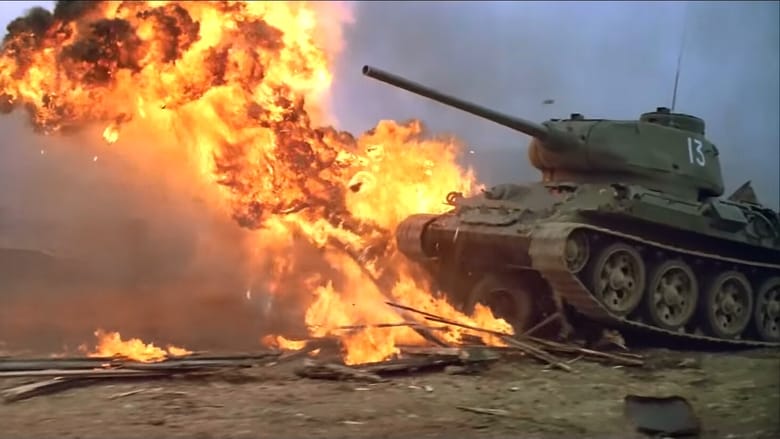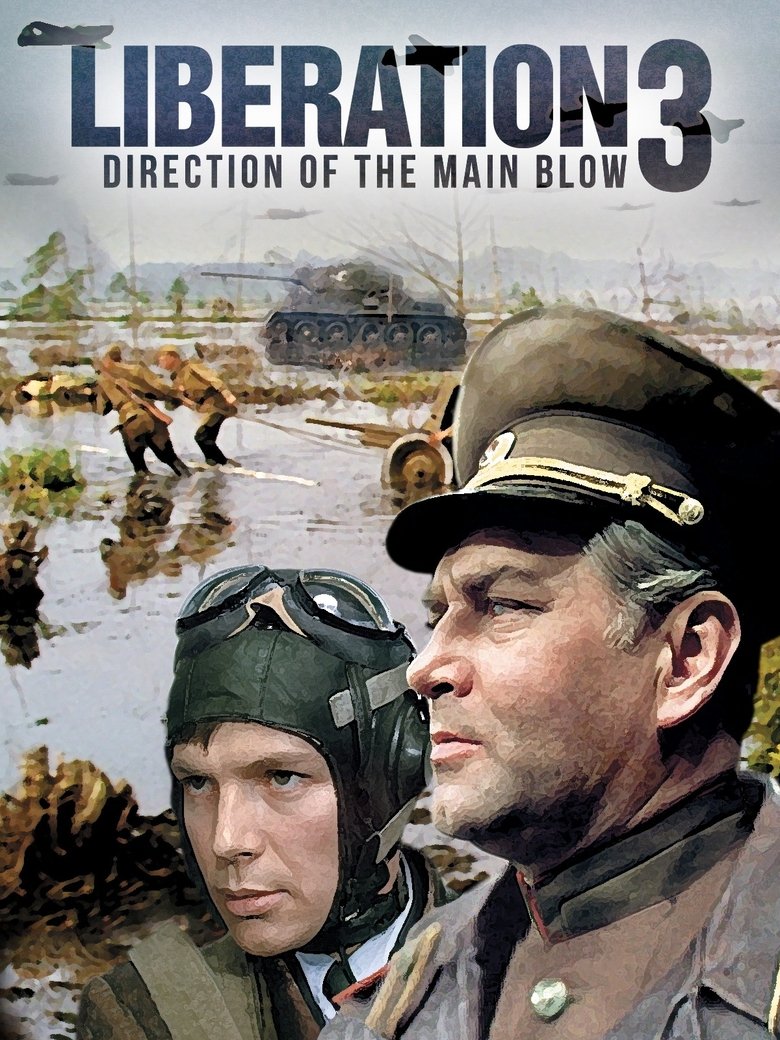

Liberation: Direction of the Main Blow
Genres
Overview
This five part epic war drama gives a dramatized detailed account of Soviet Union's war against Nazi Germany during world war two. Each of the five parts represents a separate major eastern front campaign.
Details
Budget
$0
Revenue
$0
Runtime
125 min
Release Date
1970-10-21
Status
Released
Original Language
Russian
Vote Count
99
Vote Average
6
Mikhail Ulyanov
Maršál Žukov
Fritz Diez
Hitler
Nikolay Olyalin
Cvetajev
Vladlen Davydov
Gen. Rokossovsky
Evgeni Burenkov
Gen. Vasilevsky
Aleksandr Titov
Viktor Baykov
Vyacheslav Molotov
Valentin Grachyov
Anatoliy Golbov
Mikhail Nozhkin
Yartsev
Larisa Golubkina
Zoya
Bukhuti Zakariadze
Stalin
Vasiliy Shukshin
Gen. Konev
Nikolai Rybnikov
Gen. Panov
Yury Durov
Sir Winston Churchill
Vladislav Strzhelchik
Gen. Antonov
Anatoliy Romashin
Gen. Shatilov
Pyotr Shcherbakov
Gen. Telegin
Ivan Pereverzev
Gen. Chuykov
Sergei Kharchenko
Gen. Vatutin
Dmytro Franko
Gen. Rybalko
Mykola Rushkovsky
Gen. Moskalenko
Aleksandr Afanasev
Lelyushenko
Tõnu Aav
German officer in a concentration camp
Elizaveta Alekseeva
Eleanor Roosevelt
Fred Alexander
Elyesa Bazna
Ingrīda Andriņa
German woman begging for peace
Viktor Avdyushko
Maximov
Iren Azer
Tanechka
Aleksandr Barushnoy
Alan Brooke
Manfred Bendik
Major Ernst John von Freyend
Paul Berndt
Albrecht Mertz von Quirnheim / Arthur Axmann
Max Bernhardt
Carl Friedrich Goerdeler
Erno Bertoli
Pierre Pouyade
Martha Beschort-Diez
Old Woman in Berlin
Nikolai Bogolyubov
Kliment Voroshilov
Viktor Bortsov
Grigory Oriol
Georgi Burkov
Russian soldier
Otto Busse
Heinz Linge
Ralf Böhmke
Adolf Hamann
Otto Dierichs
Erwin von Witzleben
Yuliya Dioshi
Magda Goebbels
Werner Dissel
Alfred Jodl
Leonid Dovlatov
Sergei Galadzhev
Yuriy Dubrovin
messenger sent to Leontyev
Nikolay Eryomenko
Josip Broz Tito
Olev Eskola
German Officer
Fritz Ernst Fechner
Heinz Brandt
Ivo Garrani
Mussolini
Vladimir Gerasimov
Kruglikov
Erich Gerberding
Ernst Busch
Horst Giese
Sapper Bruno Fermella / Joseph Goebbels
Horst Gill
Otto Günsche
Aleksey Glazyrin
Panteleimon Ponomarenko
Pyotr Glebov
Rotmistrov
Wieńczysław Gliński
Blacksmith
Mikhail Gluzskiy
Sgt. Ryazhentsev
Stanisław Jaśkiewicz
Roosevelt
Tadeusz Schmidt
Gen. Berling
Maciej Nowakowski
Aleksander Zawadzki
6.6
Sobibor
The film is based on a real story that happened in 1943 in the Sobibor concentration camp in German-occupied Poland. The main character of the movie is the Soviet-Jewish soldier Alexander Pechersky, who at that time was serving in the Red Army as a lieutenant. In October 1943, he was captured by the Nazis and deported to the Sobibor concentration camp, where Jews were being exterminated in gas chambers. But, in just 3 weeks, Alexander was able to plan an international uprising of prisoners from Poland and Western Europe. This uprising resulted in being the only successful one throughout the war, which led to the largest escape of prisoners from a Nazi concentration camp.
2018-05-03 | ru
5.4
The Lamp Still Burns
A tribute to the important work of female nurses during World War II.
1943-11-29 | en
9.0
Sounds of War
Bardhi, an orphan boy, goes to the city to work in the house of a rich man, where he learns how to play the violin.
1976-03-07 | sq
5.6
The Bunker
In 1944, in the Belgian - German border, seven German soldiers survive an American attack in the front and lock themselves in a bunker to protect the position. Under siege by the enemy and with little ammunition, they decide to explore underground tunnels to seek supplies and find an escape route. While in the tunnel, weird things happen with the group.
2001-09-14 | en
7.4
The Counterfeiters
The story of Jewish counterfeiter Salomon Sorowitsch, who was coerced into assisting the Nazi operation of the Sachsenhausen concentration camp during World War II.
2007-03-22 | de
4.8
The Battle of the Damned
A small band of misfit American commandos are assigned to head across the North African desert to blow up a huge German fuel depot.
1969-04-17 | it
7.4
Black Book
In the Nazi-occupied Netherlands during World War II, a Jewish singer infiltrates the regional Gestapo headquarters for the Dutch resistance.
2006-09-14 | nl
7.6
The Longest Day
The retelling of June 6, 1944, from the perspectives of the Germans, US, British, Canadians, and the Free French. Marshall Erwin Rommel, touring the defenses being established as part of the Reich's Atlantic Wall, notes to his officers that when the Allied invasion comes they must be stopped on the beach. "For the Allies as well as the Germans, it will be the longest day"
1962-09-25 | en
7.0
Before the Fall
In 1942, Friedrich Weimer's boxing skills get him an appointment to a National Political Academy (NaPolA) – high schools that produce Nazi elite. Over his father's objections, Friedrich enrolls. During his year in seventh column,Friedrich encounters hazing, cruelty, death, and the Nazi code. His friendship with Albrecht, the ascetic son of the area's governor, is central to this education.
2004-07-04 | de
7.8
To Be or Not to Be
During the Nazi occupation of Poland, an acting troupe becomes embroiled in a Polish soldier's efforts to track down a German spy.
1942-03-06 | en
7.9
Downfall
In April of 1945, Germany stands at the brink of defeat with the Russian Army closing in from the east and the Allied Expeditionary Force attacking from the west. In Berlin, capital of the Third Reich, Adolf Hitler proclaims that Germany will still achieve victory and orders his generals and advisers to fight to the last man. When the end finally does come, and Hitler lies dead by his own hand, what is left of his military must find a way to end the killing that is the Battle of Berlin, and lay down their arms in surrender.
2004-09-16 | de
7.1
Soldier of Orange
The lives of Erik Lanshof and five of his closest friends take different paths when the German army invades the Netherlands in 1940: fight and resistance, fear and resignation, collaboration and high treason.
1977-09-22 | nl
8.4
Life Is Beautiful
A touching story of an Italian book seller of Jewish ancestry who lives in his own little fairy tale. His creative and happy life would come to an abrupt halt when his entire family is deported to a concentration camp during World War II. While locked up he tries to convince his son that the whole thing is just a game.
1997-12-20 | it
8.0
Une vie avec Oradour
2011-09-21 | fr
8.2
Casablanca
In Casablanca, Morocco in December 1941, a cynical American expatriate meets a former lover, with unforeseen complications.
1943-01-15 | en
7.0
Ako sa Vinco zaťal
An unconventionally seen story from the period of the Slovak National Uprising will especially interest you with the character of the village lad and brawler Vince Kucek, played by Ivan Romančík. Hours and hours spent in the pub, riots with friends, scenes of jealousy towards his old rival Petr Chuťek, now a partisan commander, hostile memories of the strict teacher Machoň – all this fills the seemingly carefree days of the self-confident farmer, father of two small children, husband of the faithful, devoted Eva. However, the situation in the village is getting worse. Some of the men go to fight in the mountains, but the stubborn Kucek refuses to go with them.
1977-01-01 | sk
5.5
Germans
A story about a German family during World War II with every family member having a different approach to Jews, raging from hatred to compassion.
1997-05-09 | pl
7.8
Stalingrad - Stimmen aus Ruinen
Featuring excerpts from diaries and letters written by local residents and soldiers from both sides, the documentary tells the story of the Battle of Stalingrad through the voices of those who lived it.
2023-01-03 | de
5.2
Operation Cross Eagles
War - In this thrilling war drama set in Yugoslavia during WWII, a small band of courageous commandoes are sent to kidnap an important German commander in exchange for an American general being held in a German fortress. "Operation Cross Eagles" is a story of suspense and intrigue that will have you on the edge of your seat one moment and blast you back the next. - Richard Conte, Rory Calhoun, Aili King
1968-01-01 | en
0.0
Digging The Great Escape
The classic movie "The Great Escape" was based on a real life escape attempt during the second world war. This documentary follows Archaeologists who are trying to find the original tunnels dug by the real prisoners of war who escaped. Some of the surviving prisoners also join the team to assist with the tunnel locations and to describe what it was really like to live that situation. In an effort to understand the technical details of how this feet of ingenuity was achieved, the team recreate some of the equipment used by the prisoners.
2011-11-28 | en